Just a short and personal post.
My mother died last Wednesday evening. It has taken this long to write about it for a variety of reasons - being shell-shocked, even though we did know it was only a matter of time, minor glitches in the administrative procedures and other necessary arrangements, getting the news to the people who mattered.
But yesterday, Pennie and I spent a long and exhausting day in York doing the last of the things that needed doing; and today I made the last of the phonecalls. The funeral is next week.
So here we are. I am, I think, going to give myself a brief sabbatical from the blog. I feel that I would like a period of quiet, some gentle reflection. We are in the run up to Christmas, so there are a few extra things to do, and the ordinary stuff goes on regardless.
Of course, who knows what will happen, I might get a burst of energy, inspiration, enthusiasm or even the odd FO. But if I don't put in an appearance here for a while, well, no need to panic.
I will return.
Tuesday, November 15, 2011
Thursday, November 03, 2011
Ancestor bags - an exhibition
We finally got to this exhibition at the Bankfield on its very last day, Sunday. So, why haven't I blogged about it before now? You may well ask, but is there a sensible answer? Probably not!
I'm going to put some photographs up and then try to explain a little about the piece(s, not an easy thing to do as the thinking behind them is not exactly complex, but takes some thought to explain and I am not sure that I have as yet a decent grasp of the concepts. And then there is what I personally thought of it......
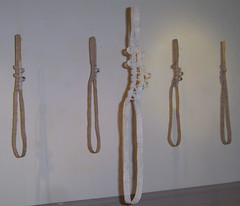
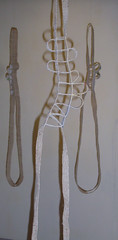
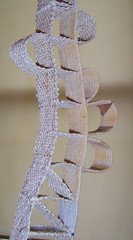
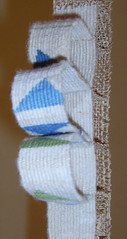
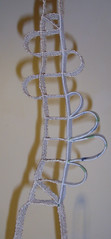

OK, here goes. Ancestor bags are Australian aboriginal ritual objects, thought to have been used for transporting the bones of the ancestors. These woven sculptures follow, overall, the shape but not the entire form of a bag. But within the construction of each, information has been coded that refers directly to the English or Australian forebear of the sculptor. Squares represent the decades of life, woollen loops the childbearing decades, and on those, dyed woven triangles delineate origin, gender and length of life of the children born. One or two things struck me immediately, and I hope are obvious from the photographs that I took - one is that it is very apparent from each individual piece whether they had a long or a short life; another is that although this references individuals, it is an installation and must also be seen as a whole - this is reinforced by the importance of the reflections of the pieces on the walls. In one of my photographs, I have been particularly pleased to see that I inadvertantly caught the woven piece, its shadow and an additional shadow of another piece not in shot. You are encouraged to walk in amongst the rows of the installation, which gave me an extraordinary sensation of walking through - what? A forest, a graveyard, a family gathering? Whatever, a powerful sense of being with shades of the past.
I loved this exhibition - I have long been an admirer of Sue's technical ability and precision as a weaver/sculptor, but this gave so much more to admire and to think about. So many things were so satisfying, like her use of classic or ethnic natural dyes for her coded sections, and also of dustings of ochre to show (I think) where children lived in Australia. I need to go back to the catalogue and study the coding again!
"Installation" so often covers a horrible multitude of sins. I have seen poor techniques and constructs, innapropriate weird and wonderful materials used in those, lazy thinking behind pieces, all sorts. This exhibition demonstrates wonderful skill, traditional materials used innovatively and a considered and thoughtful concept underpinning the whole. I might as well tell it as I see it! Shall we say, I enjoyed it.
So, for the weekend's entertainment, we are off to visit our friends in Cambridge, who have tickets for a Metropolitan Opera relay of Don Giovanni. We could have seen in York probably, but it will be great to see it, and visit, with them.
My sister is catsitting, and we will probably go together to see our mother on Monday - I went with the DSM yesterday, but P would be going on her own which seems a bit unfair. She doesn't really talk much now (although apparently she does have better days than she seemed to be having on Wednesday.) I had a quite a long talk with the senior staff member on her floor - they can't tell us much. We just have to wait. So Mozart will be a bit of a needed consolation!
I'm going to put some photographs up and then try to explain a little about the piece(s, not an easy thing to do as the thinking behind them is not exactly complex, but takes some thought to explain and I am not sure that I have as yet a decent grasp of the concepts. And then there is what I personally thought of it......






OK, here goes. Ancestor bags are Australian aboriginal ritual objects, thought to have been used for transporting the bones of the ancestors. These woven sculptures follow, overall, the shape but not the entire form of a bag. But within the construction of each, information has been coded that refers directly to the English or Australian forebear of the sculptor. Squares represent the decades of life, woollen loops the childbearing decades, and on those, dyed woven triangles delineate origin, gender and length of life of the children born. One or two things struck me immediately, and I hope are obvious from the photographs that I took - one is that it is very apparent from each individual piece whether they had a long or a short life; another is that although this references individuals, it is an installation and must also be seen as a whole - this is reinforced by the importance of the reflections of the pieces on the walls. In one of my photographs, I have been particularly pleased to see that I inadvertantly caught the woven piece, its shadow and an additional shadow of another piece not in shot. You are encouraged to walk in amongst the rows of the installation, which gave me an extraordinary sensation of walking through - what? A forest, a graveyard, a family gathering? Whatever, a powerful sense of being with shades of the past.
I loved this exhibition - I have long been an admirer of Sue's technical ability and precision as a weaver/sculptor, but this gave so much more to admire and to think about. So many things were so satisfying, like her use of classic or ethnic natural dyes for her coded sections, and also of dustings of ochre to show (I think) where children lived in Australia. I need to go back to the catalogue and study the coding again!
"Installation" so often covers a horrible multitude of sins. I have seen poor techniques and constructs, innapropriate weird and wonderful materials used in those, lazy thinking behind pieces, all sorts. This exhibition demonstrates wonderful skill, traditional materials used innovatively and a considered and thoughtful concept underpinning the whole. I might as well tell it as I see it! Shall we say, I enjoyed it.
So, for the weekend's entertainment, we are off to visit our friends in Cambridge, who have tickets for a Metropolitan Opera relay of Don Giovanni. We could have seen in York probably, but it will be great to see it, and visit, with them.
My sister is catsitting, and we will probably go together to see our mother on Monday - I went with the DSM yesterday, but P would be going on her own which seems a bit unfair. She doesn't really talk much now (although apparently she does have better days than she seemed to be having on Wednesday.) I had a quite a long talk with the senior staff member on her floor - they can't tell us much. We just have to wait. So Mozart will be a bit of a needed consolation!
Subscribe to:
Comments (Atom)
